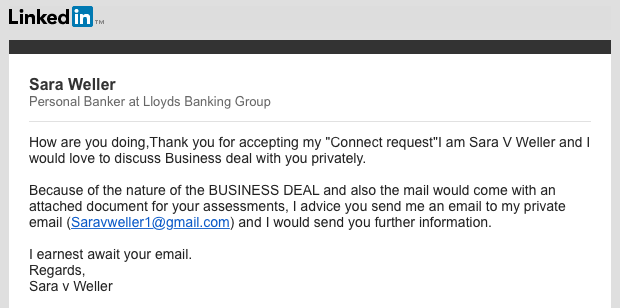I guess it was my bad in these cases and I should have never accepted a connection that I didn't know, but hey they seemed legitimate and were listed from organisations that seemed legitimate. This happened a number of times, a connection request was sent to me.
So I accepted the connection without doing too much checking of who the contact was.
In one case, within minutes of accepting, an email arrived from the new connection...Ok, I should have checked that profile better...I mean what would a director from Lloyds Banking Group be wanting to connect with me on? Ah and the email says Personal Banker, not the actual job title of the real person as listed on Lloyd's web site...yes this was a fake profile and I was completely fooled by it. Whatever the business deal was, I'm sure discussing it over email on a personal GMail address would not be appropriate either!

Needless to say, I didn't email them back. I also went to report the profile on LinkedIn, but it was already deleted. The damage was done however, the spammer got my email address.
Spammers are one thing, but opportunists are another and they are rife on LinkedIn. I've had a number of 2nd and 3rd level profiles wanting to connect. This is different because my other connections already have this person as a 1st level connection, so it should be trustworthy, right? Again, I was wrong.
Within minutes of connecting, an In-Mail arrives. "Obligation free consultation, limited offer, just for you!" That was the tone of the mail anyway. The first thing I did was remove that connection and report them as spam. This kind of thing actually happened more than blatant spamming. However, no thanks, I don't want you to sell me some service you may be peddling.
I'm really disappointed that LinkedIn is like this because it has great potential, but unfortunately there is something missing. Facebook and Twitter got it right, but whatever the special magic they've used has obviously gone astray at LinkedIn.
Don't mind me if I don't accept any new connections!
-i
